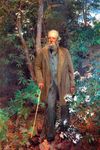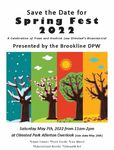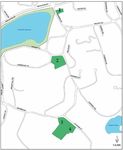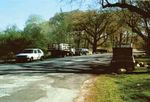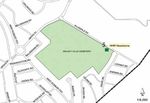PLACESpring 2022 Brookline GreenSpace Alliance is a non-profit membership organization dedicated to the enhancement of open space in Brookline by ...
←
→
Page content transcription
If your browser does not render page correctly, please read the page content below
PLACE Spring 2022 Brookline GreenSpace Alliance is a non-profit membership organization dedicated to the enhancement of open space in Brookline by supporting citizens in caring for their green spaces.
Board Members
Officers
Olmsted Bicentennial--April 26, 2022 H. H. Richardson and F. L. Olmsted
Arlene Mattison, President Deborah Rivers, AIA, LEED AP
A
Sean Lynn-Jones, Vice President
Marian Lazar, V.P.-Publications
2022 marks the bicentennial of the uthor Hugh Howard gave an online talk recently about his book, Architects
Deborah Rivers, Secretary
Ron Brown, Treasurer birth of Frederick Law Olmsted, of an American Landscape: Henry Hobson Richardson, Frederick Law
Directors America’s visionary maker of parks and Olmsted and the Reimagining of Americas Public and Private Spaces, pub-
Harry Bohrs
Ernest Cook public places. (1822-1903). In 1883, lished in January 2022. Howard said when he approached his editor about writing
Susan Helms Daley
after supervising the design and con- a book to restore H. H. Richardson’s position in American architectural history,
Anita Johnson
Hugh Mattison struction of such landmarks as Central his editor asked, “If so few know him, who will buy your book?” Considering that,
Jules Milner-Brage
Park and the US Capitol Grounds, Ol- Howard came up with the idea to add Frederick Law Olmsted, whom he had discov-
Clint Richmond
Deborah Rivers msted moved his family from New York ered to be Richardson’s most influential mentor.
Robert Schram
John Shreffler City to 99 Warren Street in Brookline, During the second half of the nineteenth century, the Green Hill neighborhood of Detail of portrait of Henry Hobson
Marilyn Ray Smith Massachusetts. It was here that he also Brookline was home to many distinguished citizens and thought leaders, including Richardson by Hubert von Herkomer.
Elissa Yanover National Portrait Gallery, Washington, D.C.
re-established his office. “Fairsted,” as Charles Sprague Sargent (first director of the Arnold Arboretum), Henry Hobson
Advisors he called it, served as both a home and Richardson, and Frederick Law Olmsted.
Michael Berger
Michael Dukakis
the world’s first full-scale professional
Frances Shedd Fisher practice of landscape architecture. All Richardson and Olmsted had met years earlier when both lived on Staten Island and
Chobee Hoy
the processes of design, from drafting maintained professional offices in Lower Manhattan. They might have met on their
Fred Perry
to printing, were carried out there. daily ferry rides to their offices or at the Century Association, a New York social club
From Fairsted, the firm collaborated for authors, artists and others with cultural interests.
Park Organizations with an impressive galaxy of suburban In their first collaboration, Richardson and Olmsted were invited to design the Buf-
Brookline Neighborhood Alliance
Chestnut Hill Garden Club
neighbors who were among the re- falo State Asylum for the Insane in late 1869. Olmsted made suggestions to Richard-
Climate Action Brookline gional and national leaders in the fields son about siting the building thus breaking down the scale of this extensive structure
Fisher Hill Association
Friends of the Beacon Street Bridle Path of architecture and horticulture, among and integrating it into the landscape. The building and grounds formed a restorative
Portrait of Frederick Law Olmsted by
Friends of Billy Ward Playground them Henry Hobson Richardson and John Singer Sargent, 1895. Biltmore Estate, setting that supported the treatment of the patients.
Friends of Boylston Street Playground Asheville, N.C.
Friends of Brookline Reservoir Charles Sprague Sargent.
Friends of Carlton Street Footbridge In 1872, Richardson’s design for Trinity Church in Boston was selected over those
Friends of Coolidge Corner Library Garden Olmsted created a notable body of park, by five other firms. In order to oversee the construction, Richardson moved his
Friends of Cypress Street Playground
Friends of Dane Park
institutional, and private residential designs that influenced the essential shape of cit- family to Brookline in 1874. There were several factors that influenced his choice,
Friends of Fairsted ies. He instilled in his colleagues and apprentices the philosophy that thoughtful and including the influential people who lived there and the picturesque, bucolic charac-
Friends of the Farmers’ Market
Friends of the Green Dog Program purposeful landscape design, which respected natural site conditions, should provide ter of the town. The house he rented
Friends of Griggs Park restorative public experiences, necessary for a healthy society. To carry out his work, at 25 Cottage Street also became his
Friends of Hall’s Pond
Friends of Hoar Sanctuary Olmsted developed a firm where he supervised the education, not only of his sons, office for which he added wings to
Friends of Larz Anderson Park John Charles, and Frederick Law, Jr., but of his many apprentices, such as Henry S. accommodate his staff.
Friends of Lawrence Park
Friends of Leverett Pond Codman and Charles Eliot, who he felt had the talent and temperament to advance
Friends of Linden Park In 1874, Olmsted was sought out
the evolving landscape design profession. The senior Olmsted believed that landscape
Friends of Littlefield Park by Charles Sprague Sargent to help
Friends of Lost Pond architects needed more than knowledge of plants and soil; they needed to under-
Friends of Minot Rose Garden create the Arnold Arboretum. After
Friends of Monmouth Park
stand the artistic nature of their work and how designed landscapes could influence
Boston passed the Park Act in 1875,
Friends of the Muddy River human activity and social values.
Friends of the Old Burying Ground the City approached Olmsted to
Friends of the Paths and Park on Aspinwall Hill Through all the designs that Olmsted created there runs one dominating and consis- design a park system for Boston.
Friends of Putterham Woods
Friends of Sargent Pond tent conception. He simplified the scene, clearing and planting to clarify the “leading He and Richardson collaborated on
Friends of Soule
Friends of Waldstein Park
motive” of the natural site and heighten the effect of a particular quality of nature. The many projects in the Boston area
Garden Club of Brookline result was a series of designs that combined richness during this period including public
Griggs Park Neighborhood Association
Lawton Park Community Garden
and wildness of planting with unified composition libraries in Stoughton, Woburn, Mal-
Larz Anderson Auto Museum
Information about the many events in celebration den, and Quincy, the North Easton
Linden Parks Association
of Olmsted’s bicentennial can be found at www. Town Hall, and the Boylston Street
olmsted200.org and www.olmstednow.org bridge, part of Olmsted’s work in the
Editor Marian Lazar
BGSA is a non-profit, tax-exempt organization under
Back Bay Fens.
section 501(c)(3) of the Internal Revenue Code.
Information about the Frederick Law Olmsted Na-
Donations are tax deductible. tional Historic Site can be found at www.nps.gov/frla While Olmsted worked from New
York, he frequently visited his friend 25 Cottage Street, H. H. Richardson’s home and office
Cover photo: Fred rick Law Olmsted National Continued on the next page
Historic Site with replaced elm tree in the foreground and collaborator in Brookline. In Photo by Deborah Rivers
2 3Richardson and Olmsted continued
early 1881, Olmsted decided to Sources:
move to Brookline to supervise
Howard, Hugh; Architects of an American Landscape: Henry Hobson Richardson,
his work for the Boston Parks and
Frederick Law Olmsted and the Reimagining of Americas Public and Private Spaces,
other projects. After renting for
2022, New York, NY, Grove Atlantic.
two years, he purchased the prop-
erty that was to become Fairsted, O’Gorman, James F.; Henry Hobson Richardson and His Office - Selected Drawings,
not far from Richardson. Over 1974, Boston, MA, Harvard College Library and David R. Godine.
time he added an office wing to Woy, Jean and McCarthy, Tina, editors, Study Report Olmsted-Richardson Thematic
accommodate the Olmsted firm’s Local Historic District, Brookline Preservation Commission, Department of Plan-
staff, similar in concept to what ning and Community Development, November 2021
Richardson had established at 25
Cottage Street. 1
Howard, Hugh; Architects of an American Landscape: Henry Hobson Richardson,
Richardson and Olmsted con- Frederick Law Olmsted and the Reimagining of Americas Public and Private Spaces,
tinued to collaborate on projects 2022, p.342
including “Stonehurst”, a house
for Robert and Lydia Paine in
Waltham, various commuter rail-
Properties in Proposed Local Historic District:
road stations surrounding Boston,
and the U.S. Capitol grounds.
1 16 Warren Street - First Home of John Charles
The office wing at Fairsted After years of declining health, Olmsted and family (opposite Reservoir)
Photo by Deborah Rivers
Richardson passed away at the age of 47 in April 1886 and was buried in Walnut Hill
2 99 Warren Street - “Fairsted” - Home/Office of
Cemetery in Brookline. The work of Richardson’s firm was carried on by successor
Frederick Law Olmsted, Sr.; Frederick Law Olmsted
firms and survives to this day as Shepley Bulfinch.
National Historic Site (National Park Service)
After F. L. Olmsted, Sr.’s death in 1903, the firm continued as Olmsted Brothers,
3 222 Warren Street - “Cliffside” - Home of John
under the leadership of John Charles Olmsted until his death in 1920 and F. L.
Charles Olmsted and family (corner of Warren and
Olmsted, Jr., who retired in 1949. In the 1930s, the firm had over 60 employees to
Cottage Streets)
handle the large number of projects, including park systems, college campuses, and
residential neighborhoods, the firm was designing. 4 25 Cottage Street - Perkins-Hooper-Richardson
House - Home/Office of Architect Henry Hobson
Fairsted, located at 99 Warren Street, was acquired by the U.S. Park Service in 1979
Richardson from 1874 - 1886
and has been restored as the Frederick Law Olmsted National Historic Site. Richard-
son’s house at 25 Cottage Street, unoccupied for more than 20 years, has not faired 5 Walnut Hills Cemetery - H. H. Richardson and Julia
well. It was once again in danger of demolition along with 222 Warren Street (the Gorham Richardson Burial Site
home of John Charles Olmsted) in January 2021. After much concern was raised by
preservationists, architects, landscape architects, and the general public, the Town of
Brookline placed an 18-month demolition delay on the properties. A Local His-
toric District consisting of 5 properties associated with Richardson and Olmsted was
proposed and approved by Town Meeting in November 2021. The LHD is in the
final stages of the regulatory process to establish the district. This will protect all five
properties from demolition.
H. H. Richardson is considered to be one of America’s greatest architects. His build-
ings created a new American architecture that responded to the needs of a country in
transition from rural to urban/suburban in the second half of the nineteenth cen-
tury. Frederick Law Olmsted is considered the father of landscape architecture. He
sought to preserve significant natural places and to integrate nature into the places
where all could enjoy it. “Together they improved the world in which their fellow
citizens,, then and since, live, work, learn and play.”1
4 5Olmsted’s Vision Restored Threespine Sticklebacks in the Emerald Necklace
F T
rederick Law Olmsted created places for people to escape from city life. He hreespine Sticklebacks are found across colder
wanted visitors to his parks to feel welcomed and safe and one way he provided waters in the northern hemisphere, most living
for safety was to create green spaces with systems of roads that allowed for the in salt water, migrating to fresh-water to spawn.
separation of different modes of transportation. He realized that a pleasant stroll in The Sticklebacks in the Emerald Necklace, in pools
Cars were often driven onto the grass the park was a different activity from a carriage ride. upstream and in Willow Pond stay in the same pool all
to have the oil changed
year. This is the only place in Massachusetts and the
In Boston and Brookline’s Emerald Necklace, Olmsted created walking southernmost place on the East Coast to find freshwa-
paths, bridle paths and roads for automobiles. On the Boston side of the ter Threespine Sticklebacks. The Massachusetts Natural
Emerald Necklace Parks, the Parkways came under the jurisdiction of the Heritage and Endangered Species Program lists this as
Metropolitan District Commission (now DCR); in Brookline Riverdale a threatened species.
Parkway was kept under Brookline control. Over the years it was allowed
to deteriorate. A metal guardrail blocked views of, and access to, Willow Threespine Sticklebacks are carnivorous, eating worms, insect larvae, fish eggs
Pond. Despite this, people often chose to walk in the middle of Riverdale and fry, including their own. Mature specimen can be up to two inches long.
Parkway instead of walking within the more secluded park. Car main- Like other male sticklebacks, after fertilizing eggs laid by females attracted to
tenance was a common occurrence on the Road. Cars and cyclists and their underwater “nest,” the males guard their brood, fanning them to ensure
pedestrians were sharing potholed, broken pavement. Meanwhile, cars they get enough oxygen, until they hatch and mature. The fish become sexually
also traveled a parallel Brookline Street—Pond Avenue. mature in a year and may live up to three years.
In 1987 as part of a resurgence of interest in Olmsted, the most sig- It is unknown how the fish wound up in these ponds. Although the Muddy
nificant early American landscape designer, and in response to deferred River flows into the Charles,
maintenance that left the Emerald Necklace almost derelict, a community which was once a tidal estuary, it
process was begun to write a Master Plan for the restoration of this im- has been cut off from the ocean
portant park system. since creation of the Emerald
Necklace and the damming of the
Realizing the opportunity to follow Olmsted’s principle of separation Charles River.
of modes of transportation, park advocates suggested that Riverdale Road
be converted into two paths—one for bicycles and one for pedestrians Preserving this threatened spe-
and that Pond Avenue be left to carry the car traffic. This restored 5 acres cies depends on preserving the
of land to green space. health of the ponds they live
in. They flourish in open clean
The decision to separate pedestrian, bicycle and car traffic was bold and water. Eroding banks and silt
Willow Pond in Olmsted Park Coir logs provide soil stabilization to control erosion
perhaps a forerunner of the current trend to create bike lanes and provide accumulation are detrimental
into the pond
safer streets for all users. It was challenging to put all the pieces in place in order for to their survival.
this significant change to be made, but it may be Olmsted having guided us to fulfill Willow Pond
his vision of safe, green places for city dwellers. This year, Willow Pond will be dredged by the Town as called for in the environ- Photo by Hugh Mattison
mental improvement portion of the Muddy
River Restoration Project. Dredging will
remove oil-soaked contaminated sediment
and contribute to improved water quality
— good for the environment, flood control,
and the Threespine Stickleback.
The fish will need to be protected during
the dredging. The Town is considering
construction of a cofferdam at the location
where the stream connects from the smaller
pond to Willow Pond. The fish primarily
live in the upstream pond, but can migrate
down into the stream and sometimes ven-
ture into Willow Pond where the stream enters
New bike path and adjacent walking
path (not seen in this photo) have the pond. The cofferdam will act as a barrier so
replaced Riverdale Parkway that the fish cannot enter Willow Pond.
6 7Non-Profit Org.
U.S. Postage
PAID
Boston MA
P.O. Box 470514 Permit #53810
Brookline MA 02447
ADDRESS SERVICE REQUESTED
PLACE is published twice a year, spring and fall, by the Brookline GreenSpace Alliance.
t. 617.277.4777 www.brooklinegreenspace.org info@brooklinegreenspace.org
Support for Friends
Groups
One of the primary objectives of the
Brookline GreenSpace Alliance is to
support and foster volunteer groups
who help care for our parks. Park
Friends groups’ contribution to
the quality of life in Brookline is
invaluable and BGSA acts as their
backup system.
The Umbrella functions of the Al-
liance include acting as fiscal agent;
promoting activities throughout the
year through email announcements,
Facebook and Twitter; holding infor-
mational meetings with the Park &
Recreation Commissioner; and host-
ing gatherings to exchange ideas.
By supplying a strong network of
park volunteers, BGSA enables indi-
vidual groups to raise funds for special
projects, attract more people to their
parks, and foster a sense of steward-
ship throughout Brookline.
Register for the BrooklineGreenspace
Annual meeting (on Zoom). Write to
info@brooklinegreenspace.org
BGSA is a sponsor of Spring Fest 2022You can also read





